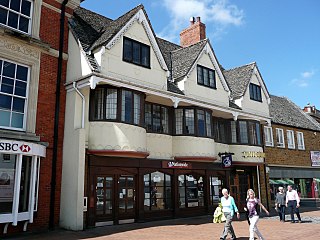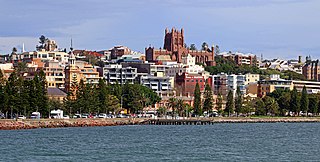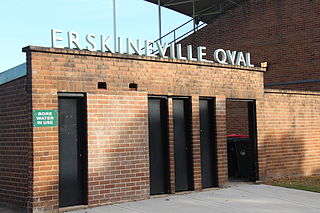
A building society is a financial institution owned by its members as a mutual organization. Building societies offer banking and related financial services, especially savings and mortgage lending. Building societies exist in the United Kingdom, Australia and New Zealand, and used to exist in Ireland and several Commonwealth countries. They are similar to credit unions in organisation, though few enforce a common bond. However, rather than promoting thrift and offering unsecured and business loans, the purpose of a building society is to provide home mortgages to members. Borrowers and depositors are society members, setting policy and appointing directors on a one-member, one-vote basis. Building societies often provide other retail banking services, such as current accounts, credit cards and personal loans. The term "building society" first arose in the 19th century in Great Britain from cooperative savings groups.

Newcastle is a metropolitan area and the second most populated city in the state of New South Wales, Australia. It includes the Newcastle and Lake Macquarie local government areas, and is the hub of the Greater Newcastle area, which includes most parts of the local government areas of City of Newcastle, City of Lake Macquarie, City of Cessnock, City of Maitland and Port Stephens Council.
Tabcorp is Australia's largest gambling company, employing more than 5,000 people. It is the largest provider of wagering and gaming products and services in Australia. Tabcorp is listed on the Australian Securities Exchange (ASX).
A chit fund is a type of rotating savings and credit association system practiced in India, Bangladesh, Sri Lanka, Pakistan other Asian countries. Chit fund schemes may be organized by financial institutions, or informally among friends, relatives, or neighbours. In some variations of chit funds, the savings are for a specific purpose. Chit funds are often microfinance organizations.
In Australia, superannuation, or just super, is the term for retirement pension benefit funds. Most working Australians deposit deductions from their income into these funds, and employers make similar regular contributions. Most employees contribute to large funds either industry funds, or retail funds. However, some working Australians deposit their income deductions into self-managed superannuation funds.
The United Kingdom is home to a widespread and diverse co-operative movement, with over 7000 registered co-operatives owned by 17 million individual members and which contribute £34bn a year to the British economy. Modern co-operation started with the Rochdale Pioneers' shop in the northern English town of Rochdale in 1844, though the history of co-operation in Britain can be traced back to before 1800. The British co-operative movement is most commonly associated with The Co-operative brand which has been adopted by several large consumers' co-operative societies; however, there are many thousands of registered co-operative businesses operating in the UK. Alongside these consumers' co-operatives, there exist many prominent agricultural co-operatives (621), co-operative housing providers (619), health and social care cooperatives (111), cooperative schools (834), retail co-operatives, co-operatively run community energy projects, football supporters' trusts, credit unions, and worker-owned businesses.

The City of Sydney Library network consists of nine branch libraries and two 'library links', located in Australia within the City of Sydney Council administrational area.

Erskineville Oval is a sporting venue in Erskineville, Sydney, New South Wales, Australia. Originally developed and opened in 1885 as Macdonaldtown Park, it was later renamed in 1892 to its current form with the municipality name change of the local government body. At approximately a capacity of 5000 spectators, previously 2000 Erskineville Oval was formerly an AFL venue as of 1903 when the NSW Australian Football League was founded. From 1913, the ground become a rugby venue as well, in which it has since hosted professional teams such as Newtown and the South Sydney Rabbitohs.
The Savings Bank of South Australia was founded in 1848, trading from a single room in Gawler Place, Adelaide. In 1984 it merged with the State Bank of South Australia, with the merged entity taking the latter name. The Bank of South Australia is now a division and a trading name of St.George Bank, which is now a subsidiary of Westpac.

The Coventry Building Society is a building society based in Coventry, England. It is the second largest in the United Kingdom with total assets of more than £51 billion at 31 December 2020. It is a member of the Building Societies Association. The society has 1.5 million saver-members and a further 350,000 borrower-members.
Terminating deposits were a form of savings-and-loan that were one of the key products of the early building society movement in the UK and from there they spread through what is now the Commonwealth. They were banned in the UK around 1910, and are now illegal everywhere, the last vestiges being seen in New Zealand.
Stokvels are invitation-only clubs of twelve or more people serving as rotating credit unions or saving schemes in South Africa where members contribute fixed sums of money to a central fund on a weekly, fortnightly or monthly basis. The name “stokvel” originated from the term “stock fairs”, as the rotating cattle auctions of English settlers in the Eastern Cape during the early 19th century were known.

Gambling is an activity undertaken by many Australians. Over 80% of Australian adults engage in gambling of some kind, which is the highest rate of gambling in the world. This number includes some 4% of the adult population who play the pokies once a week, accounting for some 62% of locals' annual gambling spend.

The Rail Motor Society, based at Paterson, New South Wales, is a community owned collection of preserved self-propelled railway vehicles and equipment from the former New South Wales Government Railways. The items in its collection date from 1923 through to 1972.
Greater Bank is an Australian customer-owned bank and mutual financial institution with headquarters in Hamilton, New South Wales. The bank was previously known as the Greater Building Society, or simply "The Greater”, and provides services to customers in New South Wales and southeast Queensland through branches, mobile lenders, its own ATM network, access to the Westpac ATM network, Internet and mobile banking, and a Newcastle-based customer service call centre.
Rainbow Saver Anglia Credit Union Limited was a not-for-profit member-owned financial co-operative, based in Lowestoft and operated through 18 collection points in the East Anglian counties of Suffolk, Cambridgeshire and certain districts of Norfolk. It was established in 1999 and had 3,500 members.
The Co-operative Family Credit Union Limited is a not-for-profit member-owned financial co-operative, based in Manchester and operating throughout the United Kingdom. Members elect the directors, vote on share dividend and can become actively involved as volunteers.
Eastern Savings and Loans Credit Union Limited is a not-for-profit member-owned financial co-operative, based in Ipswich and operating through 25 local payment and information points in the East Anglian counties of Suffolk, Cambridgeshire and Norfolk. The credit union has 6,500 members.
The Irish loan funds were microcredit organizations that operated in Ireland between 1720 and 1915. They were run by local associations that made small loans to the industrious poor, and were often very successful. At peak there were about 300 loan funds.

The Minister for Co-operative Societies, later Minister for Cooperatives was a ministry in the government of New South Wales, with responsibility for regulating and registering co-operative societies, including housing societies, friendly societies, Starr-Bowkett Societies, credit unions and building societies. It has had three iterations, from September 1949 until February 1983, from February 1986 until March 1988 and from June 1991 until April 1995.








